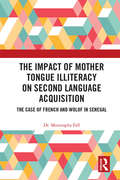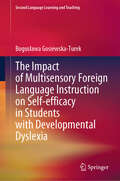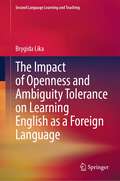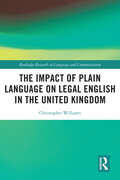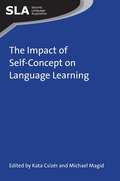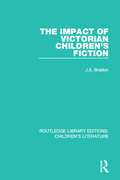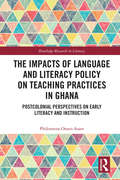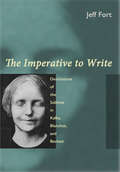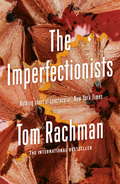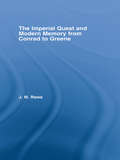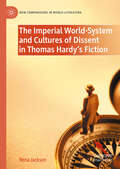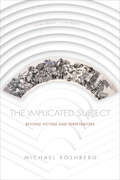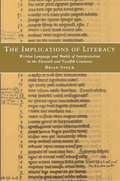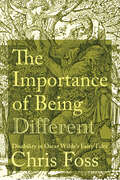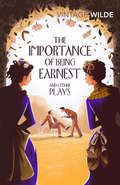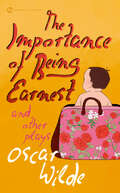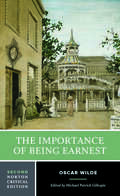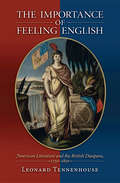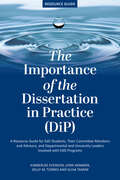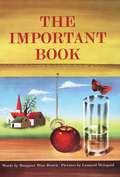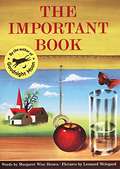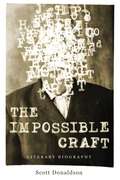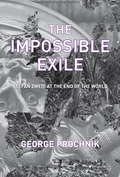- Table View
- List View
The Impact of Mother Tongue Illiteracy on Second Language Acquisition: The Case of French and Wolof in Senegal (Routledge Research in Language Education)
by Moustapha FallThis text illustrates the crucial role of the mother tongue literacy in second language acquisition by presenting findings from a comparative study conducted in primary schools in Senegal. In addition, the volume provides an in-depth look at the linguistic history of Senegal before, during, and after French colonialism. The Impact of Mother Tongue Illiteracy on Second Language Acquisition discusses the socio-linguistic landscape and ethnolinguistic composition of Senegal and its effect on the second language acquisition. An in-depth analysis of children’s phonological awareness, decoding, and reading comprehension in French reveals significant disparities in the literacy skills of Wolof children who have been exposed to Arabic and Qur’anic texts prior to schooling, and those who have not. In doing so, the text explores the impacts of post-colonial language policies in Africa, highlights the pedagogical consequences of mother tongue illiteracy, and questions the use of French as the only language of instruction in Senegalese schools. This detailed research text will of great interest and use to graduate and postgraduate students, researchers, academics, professionals and policy makers in the field of Second Language Acquisition, Multicultural Education, Applied Linguistics, French language education and, Language Policy and Planning.
The Impact of Multisensory Foreign Language Instruction on Self-efficacy in Students with Developmental Dyslexia (Second Language Learning and Teaching)
by Bogusława Gosiewska-TurekThis book investigates the effect of multisensory instruction on self-efficacy among students with developmental dyslexia learning English as a foreign language. The first three chapters of the book delve into theoretical aspects of developmental dyslexia, multisensory instruction, and self-efficacy, providing an overview of existing research in this domain. The second part of the book reports empirical findings obtained from a case study supplemented by quantitative analysis. These findings highlight the advantages of employing multisensory instructional techniques for teaching foreign languages to students with dyslexia. Notably, the application of multisensory instruction not only enhances dyslexic students’ foreign language competencies but also positively impacts their self-efficacy. The study underscores the importance of language instruction tailored to the special educational needs of students with dyslexia as well as its potential to foster self-efficacy, an essential factor for success in foreign language learning.
The Impact of Openness and Ambiguity Tolerance on Learning English as a Foreign Language (Second Language Learning and Teaching)
by Brygida LikaThis book highlights the importance of individual learner differences in learning English as a foreign language and reports the findings of a study which investigated the impact of two personality traits, which are, openness to experience and ambiguity tolerance, on target language attainment among Polish secondary school students. The book provides an exhaustive overview of the theoretical issues and existing research related to personality, emphasizing the two traits under investigation, openness, and ambiguity tolerance, which are the focus of the empirical study reported later in the book. The empirical investigation explored relationships between openness to experience and ambiguity tolerance, as well as their impact on attainment in learning English as a foreign language. Moreover, it also aimed to shed light on the link between these traits and students’ assessments (i.e., self-assessment and school grades). The findings of the study provide a basis for proposing specific profiles of foreign language learners with different levels of openness and ambiguity tolerance.
The Impact of Plain Language on Legal English in the United Kingdom (Routledge Research in Language and Communication)
by Christopher WilliamsThis volume offers insights into the ways in which plain language has influenced the language of the law in the United Kingdom, critically reflecting on its historical development and future directions. The book opens with an overview of the theoretical frameworks underpinning plain language and a brief history of plain language initiatives as a foundation from which to outline ongoing debates on the opportunities and challenges of using plain language in the legal domain. The volume details strands where plain language has had considerable impact thus far on legal English in the UK, notably in legislative drafting, but it also explores areas in which plain language has made fewer inroads, such as the language of court judgments and that of online terms and conditions. The book looks ahead to unpack highly topical areas within the plain language debate, including the question of design and visualisation and the ramifications of digitalisation, contributing to ongoing conversations on the importance of plain language both in the UK and beyond. This book will be of particular interest to students and scholars interested in the intersection of language and the law as well as related disciplinary areas such as applied linguistics and English for Specific Purposes.
The Impact of Self-Concept on Language Learning
by Kata Csizér Michael MagidThis edited volume seeks to highlight the effects of self-concept on L2 learning and teaching by considering a wide range of theories as well as their practical application. The book is divided into four sections and includes: chapters discussing various approaches related to self-concept; empirical studies related to the selves of the learners; research from teachers' perspectives on students' self-concept; and L2 motivational intervention studies associated with the development of self-concept of language learners. The volume contains a collection of studies from around the world (Central Europe, Canada, Asia and Australia) which were carried out using a variety of research methods and have a range of foci including adult and young learners, public and private education, foreign and second language settings, and teacher and learner motivation.
The Impact of Victorian Children's Fiction (Routledge Library Editions: Children's Literature #1)
by J. S. BrattonOriginally published in 1981. Many of the classics of children’s literature were produced in the Victorian period. But Alice in Wonderland and The King of the Golden River were not the books offered to the majority of children of the time. When writing for children began to be taken seriously, it was not as an art, but as an instrument of moral suasion, practical instruction, Christian propaganda or social control. This book describes and evaluates this body of literature. It places the books in the economic and social contexts of their writing and publication, and considers many of the most prolific writers in detail. It deals with the stories intended to teach the newly-literate poor their social and religious lessons: sensational romances, tales of adventure and military glory, through which the boys were taught the value of self-help and inspired with the ideals of empire; and domestic novels, intended to offer girls a model for the expression of heroism and aspiration within the restricted Victorian woman’s world.
The Impacts of Language and Literacy Policy on Teaching Practices in Ghana: Postcolonial Perspectives on Early Literacy and Instruction (Routledge Research in Literacy)
by Philomena Osseo-AsareThis text critically examines changes in Ghanaian language and literacy policy following independence in 1957 to consider its impacts on early literacy teaching. By adopting a postcolonial theoretical perspective, the text interrogates the logic behind policy changes which have prioritised English, local language, or biliteracy. It draws on data from interviews with teachers and researcher observation to demonstrate how policies have influenced teaching and learning. Dr Osseo-Asare’s findings inform the development of a conceptual framework which highlights the socio-cultural factors that impact the literacy and biliteracy of young children in Ghana, offering solutions to help teachers combat the challenges of frequent policy changes. This timely monograph will prove to be an essential resource not only for researchers working on education policies, teacher education, and English-language learning in postcolonial Ghana but also for those looking to identify the thematic and methodological nuances of studying literacy and education in postcolonial contexts.
The Imperative to Write: Destitutions of the Sublime in Kafka, Blanchot, and Beckett
by Jeff FortIs writing haunted by a categorical imperative? Does the Kantian sublime continue to shape the writer’s vocation, even for twentieth-century authors? What precise shape, form, or figure does this residue of sublimity take in the fictions that follow from it—and that leave it in ruins?This book explores these questions through readings of three authors who bear witness to an ambiguous exigency: writing as a demanding and exclusive task, at odds with life, but also a mere compulsion, a drive without end or reason, even a kind of torture. If Kafka, Blanchot, and Beckett mimic a sublime vocation in their extreme devotion to writing, they do so in full awareness that the trajectory it dictates leads not to metaphysical redemption but rather downward, into the uncanny element of fiction. As this book argues, the sublime has always been a deeply melancholy affair, even in its classical Kantian form, but it is in the attenuated speech of narrative voices progressively stripped of their resources and rewards that the true nature of this melancholy is revealed.
The Imperfect Friend
by Wendy OlmstedMany writers in early modern England drew on the rhetorical tradition to explore affective experience. In The Imperfect Friend, Wendy Olmsted examines a broad range of Renaissance and Reformation sources, all of which aim to cultivate 'emotional intelligence' through rhetorical means, with a view to understanding how emotion functions in these texts. In the works of Sir Philip Sidney (1554-1586), John Milton (1608-1674), and many others, characters are depicted conversing with one another about their emotions. While counselors appeal to objective reasons for feeling a certain way, their efforts to shape emotion often encounter resistance.This volume demonstrates how, in Renaissance and Reformation literature, failures of persuasion arise from conflicts among competing rhetorical frameworks among characters. Multiple frameworks, Olmsted argues, produce tensions and, consequently, an interiorized conflicted self. By situating emotional discourse within distinct historical and socio-cultural perspectives, The Imperfect Friend sheds new light on how the writings of Sidney, Milton, and others grappled with problems of personal identity. From their innovations, the study concludes, friendship emerges as a favourite site of counseling the afflicted and perturbed.
The Imperfectionists: A Novel
by Tom RachmanThe charming and enthralling story of an idiosyncratic English-language newspaper in Rome and the lives of its staffers as the paper fights for survival in the internet age.'A precise, playful fiction with a deep but lightly worn intelligence' - Times Literary SupplementThe newspaper was founded in Rome in the 1950s, a product of passion and a multi-millionaire's fancy. Over fifty years, its eccentricities earned a place in readers' hearts around the globe. But now, circulation is down, the paper lacks a website, and the future looks bleak. Still, those involved in the publication seem to barely notice. The obituary writer is too busy avoiding work. The editor-in-chief is pondering sleeping with an old flame. The obsessive reader is intent on finishing every old edition, leaving her trapped in the past. And the publisher seems less interested in his struggling newspaper than in his magnificent basset hound, Schopenhauer. The Imperfectionists interweaves the stories of eleven unusual and endearing characters who depend on the paper. Funny and moving, the novel is about endings - the end of life, the end of sexual desire, the end of the era of newspapers - and about what might rise afterward.
The Imperial Quest and Modern Memory from Conrad to Greene (Literary Criticism and Cultural Theory)
by Julia RawaFirst Published in 2005. Routledge is an imprint of Taylor & Francis, an informa company.
The Imperial World-System and Cultures of Dissent in Thomas Hardy's Fiction (New Comparisons in World Literature)
by Rena JacksonThis is the first book-length study of imperial crossings in Thomas Hardy’s novels and short stories. Combining the strengths of world-literary and world-systems analyses with a cultural materialist approach, the study offers unparalleled coverage of global links in Hardy’s fiction, engaging, in addition, with a range of dissenting responses – at both formal and thematic registers – to the British world-system’s exploitative structures. Hardy’s prose outputs reveal that the empire, contrary to popular critical assumptions in postcolonial studies, did not harmonise the classes, genders or regions into a shared national imperial identity, culture or destiny. A major component of the study additionally includes comparative readings of the 'modern' world-system and imperial sociality in writings by Joseph Conrad, H. Rider Haggard, Elizabeth Gaskell, Rudyard Kipling, David Livingstone, and in Chartist poetry. The book will be an invaluable resource to teachers, students and enthusiasts working in the field of world literature, and in Victorian, postcolonial and settler colonial studies.
The Implicated Subject: Beyond Victims and Perpetrators (Cultural Memory in the Present)
by Michael RothbergWhen it comes to historical violence and contemporary inequality, none of us are completely innocent. We may not be direct agents of harm, but we may still contribute to, inhabit, or benefit from regimes of domination that we neither set up nor control. Arguing that the familiar categories of victim, perpetrator, and bystander do not adequately account for our connection to injustices past and present, Michael Rothberg offers a new theory of political responsibility through the figure of the implicated subject. The Implicated Subject builds on the comparative, transnational framework of Rothberg's influential work on memory to engage in reflection and analysis of cultural texts, archives, and activist movements from such contested zones as transitional South Africa, contemporary Israel/Palestine, post-Holocaust Europe, and a transatlantic realm marked by the afterlives of slavery. As these diverse sites of inquiry indicate, the processes and histories illuminated by implicated subjectivity are legion in our interconnected world. An array of globally prominent artists, writers, and thinkers—from William Kentridge, Hito Steyerl, and Jamaica Kincaid, to Hannah Arendt, Primo Levi, Judith Butler, and the Combahee River Collective—speak to this interconnection and show how confronting our own implication in difficult histories can lead to new forms of internationalism and long-distance solidarity.
The Implications of Literacy: Written Language and Models of Interpretation in the 11th and 12th Centuries
by Brian StockThis book explores the influence of literacy on eleventh and twelfth-century life and though on social organization, on the criticism of ritual and symbol, on the rise of empirical attitudes, on the relationship between language and reality, and on the broad interaction between ideas and society.Medieval and early modern literacy, Brian Stock argues, did not simply supersede oral discourse but created a new type of interdependence between the oral and the written. If, on the surface, medieval culture was largely oral, texts nonetheless emerged as a reference system both for everyday activities and for giving shape to larger vehicles of interpretation. Even when texts were not actually present, people often acted and behaved as if they were.The book uses methods derived from anthropology, from literary theory, and from historical research, and is divided into five chapters. The first treats the growth and shape of medieval literacy itself. Theo other four look afresh at some of the period's major issues--heresy, reform, the Eucharistic controversy, the thought of Anselm, Abelard, and St. Bernard, together with the interpretation of contemporary experience--in the light of literacy's development. The study concludes that written language was the chief integrating instrument for diverse cultural achievements.
The Importance of Being Different: Disability in Oscar Wilde's Fairy Tales (Peculiar Bodies)
by Chris FossUnderstanding Oscar Wilde&’s characteristically unique approach to writing difference Over the course of his remarkable career, Oscar Wilde published two volumes of fairy tales: The Happy Prince and Other Tales and A House of Pomegranates. Both collections feature numerous stories with protagonists who may be said to be disability-aligned, owing to their pronounced physical differences. In The Importance of Being Different, Chris Foss explores the way that Wilde&’s stories problematically replicate many of the Victorian era&’s typical responses to disability but also the ways they diverge, offering a more progressive orientation—both through more sympathetic identifications with disability-aligned characters and through a self-conscious foregrounding of the mechanisms of pity and the consumption of pain. The first ever monograph to examine Wilde&’s work through a disability studies lens, this groundbreaking book encompasses all of his fairy tales as well as his writings during and after imprisonment. Even though Wilde unflinchingly represented the extent to which these peculiar bodies suffered rejection by society, he encouraged his readers to embrace them and to advocate for emotional responses that engage love and kindness toward both individual transformation and social change.
The Importance of Being Earnest and Other Plays
by Oscar WildeA selection of Oscar Wilde's best and most important plays - sharp, relevant and brilliant to this day. Who would have thought a comedy of manners written more than a hundred years ago would still be so apt and so funny? Oscar Wilde was a genius of play-writing, and his deftness, wit and sharp eye for social satire keep audiences in thrall to this day. Alongside Earnest, discover a biblical tragedy retold, Lady Windemere and her infamous fan and Wilde's take on an ideal husband, in this selection of Wilde's most important plays. ‘[The Importance of Being Earnest] has a strong claim to being the most perfect comedy in the English language’ Daily Telegraph
The Importance of Being Earnest and Other Plays
by Oscar WildeA universal favorite, The Importance of Being Earnest displays Oscar Wilde&’s wit and theatrical genius at their brilliant best. Subtitled &“A Trivial Comedy for Serious People,&” this hilarious attack on Victorian manners and morals turns a pompous world on its head, lets duplicity lead to happiness, and makes riposte the highest form of art. Written, according to Wilde, &“by a butterfly for butterflies,&” it is a dazzling masterpiece of comic entertainment.Although it was originally written in four acts, The Importance of Being Earnest is usually performed in a three-act version. This authoritative edition features an appendix that restores valuable lines that appeared in the original.Also included in this special collection are Wilde&’s first comedy success, Lady Windermere&’s Fan, and his richly sensual melodrama, Salomé, which he called &“that terrible coloured little tragedy I once in some strange mood wrote&”—and which shocked and enraged the censors of his time.Includes an Introduction by Sylvan Barnetand an Afterword by Elise Bruhl and Michael Gamer
The Importance of Being Earnest: A Norton Critical Edition (Norton Critical Editions #0)
by Oscar Wilde“This revised Norton Critical Edition of The Importance of Being Earnest exemplifies the usefulness of the series for generations of students. Michael Patrick Gillespie’s introduction captures the sleight of hand that makes the play at once so irresistible to read and yet difficult to teach. His updated selection of background and critical materials is designed to address those difficulties and support a myriad of reader queries. This will become the gold standard for classroom use.” —Colleen Jaurretche, University of California, Los Angeles “This Second Edition retains the good material from the first edition, especially Gillespie’s preface—a great introduction to Wilde’s life and the play. The new critical essays supplementing the historical views open great approaches to the paradoxes of the play and Wilde himself. This new edition provides a great text and critical material for reading, for enhancing comprehension, and, most importantly, for enjoying The Importance of Being Earnest. It is a great text for teachers, and a perfect primer for students.” —Tim Gallagher, Messmer High School, Milwaukee, WI The text of this Norton Critical Edition of The Importance of Being Earnest is the established three-act 1895 version. The play was originally produced in four acts. Wilde shortened it to three at the urging of George Alexander, the owner of the St. James Theatre and first actor to play Jack Worthing. The play is accompanied by explanatory annotations and by an appendix of excised portions. “Backgrounds” includes essays on Wilde and the 1890s by prominent cultural critics Karl Beckson, Sharon Marcus, and Michael Patrick Gillespie. “Early Reviews and Reactions” collects contemporary responses to The Importance of Being Earnest, including George Bernard Shaw’s famous dissenting review and other commentary by H. G. Wells, Hamilton Fyfe, and William Archer. “Essays in Criticism” includes seven diverse assessments—six of them new to the Second Edition—of Wilde and the play by E. H. Mikhail, Burkhard Niederhoff, Christopher S. Nassaar, Clifton Snider, Brigitte Bastiat, Eibhear Walshe, and Maneck H. Daruwala. A chronology and selected bibliography are also included This purchase offers access to the digital ebook only.
The Importance of Feeling English: American Literature and the British Diaspora, 1750-1850
by Leonard TennenhouseAmerican literature is typically seen as something that inspired its own conception and that sprang into being as a cultural offshoot of America's desire for national identity. But what of the vast precedent established by English literature, which was a major American import between 1750 and 1850? In The Importance of Feeling English, Leonard Tennenhouse revisits the landscape of early American literature and radically revises its features. Using the concept of transatlantic circulation, he shows how some of the first American authors--from poets such as Timothy Dwight and Philip Freneau to novelists like William Hill Brown and Charles Brockden Brown--applied their newfound perspective to pre-existing British literary models. These American "re-writings" would in turn inspire native British authors such as Jane Austen and Horace Walpole to reconsider their own ideas of subject, household, and nation. The enduring nature of these literary exchanges dramatically recasts early American literature as a literature of diaspora, Tennenhouse argues--and what made the settlers' writings distinctly and indelibly American was precisely their insistence on reproducing Englishness, on making English identity portable and adaptable. Written in an incisive and illuminating style, The Importance of Feeling English reveals the complex roots of American literature, and shows how its transatlantic movement aided and abetted the modernization of Anglophone culture at large.
The Importance of the Dissertation in Practice (DiP): A Resource Guide for EdD Students, Their Committee Members and Advisors, and Departmental and University Leaders Involved with EdD Programs
by Kimberlee K. C. Everson Lynn Hemmer Kelly M. Torres and Suha R. TamimThe Importance of the Dissertation in Practice (DiP): A Resource Guide for EdD Students, Their Committee Members and Advisors, and Departmental and University Leaders Involved with EdD Programs is the first book-length study that looks at the elements of high-quality Dissertations in Practice (DiPs). It serves as a resource for EdD students, their committee members, their advisors, and departmental or university leaders involved with EdD programs. The book can be used to improve support from key stakeholders within EdD programs for the implementation of the DiP in the development of practitioner-scholars. <P><P> The first section of the book discusses the difference between the DiP and traditional dissertations, the history of the DiP, and how the practitioner-scholar is developed through the DiP process. Next, the book describes the elements that are reflective of a high-quality DiP. Finally, it addresses a few of the unique formats that are sometimes used with the DiP, some of the practical issues with implementing the DiP, and issues of the future including the use of artificial intelligence. <P><P> The ultimate goal of The Importance of the Dissertation in Practice is to serve as a practical guide for all those involved with the DiP, reflecting the editors’ and authors’ experiences working with students within a variety of higher education institutions.
The Important Book
by Margaret Wise BrownThe important thing about The Important Book -- is that you let your child tell you what is important about the sun and the moon and the wind and the rain and a bug and a bee and a chair and a table and a pencil and a bear and a rainbow and a cat (if he wants to). For the important thing about The Important Book is that the book goes on long after it is closed. What is most important about many familiar things -- like rain and wind, apples and daisies -- is suggested in rhythmic words and vivid pictures. 'A perfect book . . . the text establishes a word game which tiny children will accept with glee.' -- K.
The Important Book (Into Reading, Read Aloud Module 2 #1)
by Leonard Weisgard Margaret BrownNIMAC-sourced textbook <p><p> Margaret Wise Brown, the New York Times bestselling author of the perennial classics Goodnight Moon and Runaway Bunny, asks children to think deeply about the importance of everyday objects, from apples to spoons. With lyrical words and vivid illustrations by Caldecott winner Leonard Weisgard, The Important Book shows children just how important everyday objects can be. <p> What is the most important thing about a spoon? The fact that you can eat with it? What about an apple? Or a shoe? This book helps curious preschoolers notice important details about their everyday surroundings, like daisies are white, rain is wet, and a spoon is used for eating.
The Impossible Craft: Literary Biography (Penn State Series in the History of the Book)
by Scott DonaldsonIn The Impossible Craft, Scott Donaldson explores the rocky territory of literary biography, the most difficult that biographers try to navigate. Writers are accustomed to controlling the narrative, and notoriously opposed to allowing intruders on their turf. They make bonfires of their papers, encourage others to destroy correspondence, write their own autobiographies, and appoint family or friends to protect their reputations as official biographers. Thomas Hardy went so far as to compose his own life story to be published after his death, while falsely assigning authorship to his widow. After a brief background sketch of the history of biography from Greco-Roman times to the present, Donaldson recounts his experiences in writing biographies of a broad range of twentieth-century American writers: Ernest Hemingway, F. Scott Fitzgerald, John Cheever, Archibald MacLeish, Edwin Arlington Robinson, Winfield Townley Scott, and Charlie Fenton. Donaldson provides readers with a highly readable insiders’ introduction to literary biography. He suggests how to conduct interviews, and what not to do during the process. He offers sound advice about how closely biographers should identify with their subjects. He examines the ethical obligations of the biographer, who must aim for the truth without unduly or unnecessarily causing discomfort or worse to survivors. He shows us why and how misinformation comes into existence and tends to persist over time. He describes “the mythical ideal biographer,” an imaginary creature of universal intelligence and myriad talents beyond the reach of any single human being. And he suggests how its very impossibility makes the goal of writing a biography that captures the personality of an author a challenge well worth pursuing.
The Impossible Craft: Literary Biography (Penn State Series in the History of the Book)
by Scott DonaldsonIn The Impossible Craft, Scott Donaldson explores the rocky territory of literary biography, the most difficult that biographers try to navigate. Writers are accustomed to controlling the narrative, and notoriously opposed to allowing intruders on their turf. They make bonfires of their papers, encourage others to destroy correspondence, write their own autobiographies, and appoint family or friends to protect their reputations as official biographers. Thomas Hardy went so far as to compose his own life story to be published after his death, while falsely assigning authorship to his widow. After a brief background sketch of the history of biography from Greco-Roman times to the present, Donaldson recounts his experiences in writing biographies of a broad range of twentieth-century American writers: Ernest Hemingway, F. Scott Fitzgerald, John Cheever, Archibald MacLeish, Edwin Arlington Robinson, Winfield Townley Scott, and Charlie Fenton. Donaldson provides readers with a highly readable insiders’ introduction to literary biography. He suggests how to conduct interviews, and what not to do during the process. He offers sound advice about how closely biographers should identify with their subjects. He examines the ethical obligations of the biographer, who must aim for the truth without unduly or unnecessarily causing discomfort or worse to survivors. He shows us why and how misinformation comes into existence and tends to persist over time. He describes “the mythical ideal biographer,” an imaginary creature of universal intelligence and myriad talents beyond the reach of any single human being. And he suggests how its very impossibility makes the goal of writing a biography that captures the personality of an author a challenge well worth pursuing.
The Impossible Exile
by George ProchnikAn original study of exile, told through the biography of Austrian writer Stefan Zweig By the 1930s, Stefan Zweig had become the most widely translated living author in the world. His novels, short stories, and biographies were so compelling that they became instant best sellers. Zweig was also an intellectual and a lover of all the arts, high and low. Yet after Hitler's rise to power, this celebrated writer who had dedicated so much energy to promoting international humanism plummeted, in a matter of a few years, into an increasingly isolated exile--from London to Bath to New York City, then Ossining, Rio, and finally Petrópolis--where, in 1942, in a cramped bungalow, he killed himself. The Impossible Exile tells the tragic story of Zweig's extraordinary rise and fall while it also depicts, with great acumen, the gulf between the world of ideas in Europe and in America, and the consuming struggle of those forced to forsake one for the other. It also reveals how Zweig embodied, through his work, thoughts, and behavior, the end of an era--the implosion of Europe as an ideal of Western civilization.
